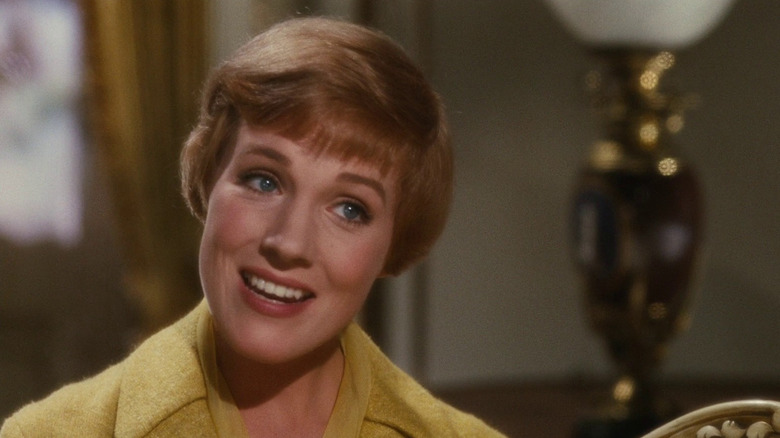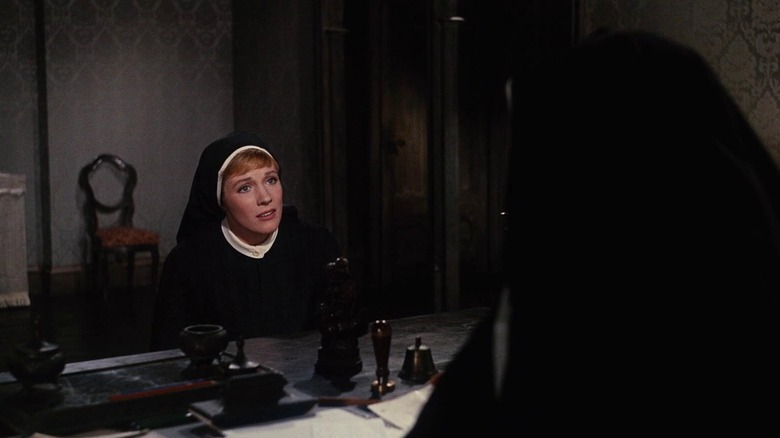A Fired Fox Exec Returned From Exile To Save The Sound Of Music
Note: This article discusses sexual misconduct and abuse.
As much as I roll my eyes at Joe Russo blaming Marvel's pandemic-era box office woes on the children, he's right about one thing: Hollywood, like the world at large, is at a crossroads at the time of this writing. Superhero films, which have been the bread and butter of the industry for most of the 21st century, are no longer a reliable draw. We also find ourselves in a curious place where franchise fatigue seems to be settling in, yet it remains challenging for anything that isn't based on an IP to find financial success. At the same time, the growing popularity of smaller and scrappier fare from studios like A24 could point to a way forward.
It's a lot like the 1960s, when you think about it. By the end of that decade, the American New Wave was in full swing. Creatively audacious films like "Bonnie and Clyde," "The Graduate," "Night of the Living Dead," and "Midnight Cowboy" signaled a shift away from the crowd-pleasing Hollywood spectacles of old and into the grittier, cynical fare of the '70s. Studios knew the writing was on the wall long before that, though. When Alfred Hitchcock released "Psycho" in 1960, its popularity "symbolized a Hollywood cinema now driven by sensation rather than sentiment," as Tom Santopietro argues in his 2015 book "The Sound of Music Story." Here, we had a proto-slasher where the heroes aren't so heroic, the A-list lead could die partway though the film, and people in movies could (le gasp!) flush toilets.
Things being in flux the way they were, it was tricky for an unabashedly cheery and romantic musical like "The Sound of Music" to secure a green-light. This is where Darryl F. Zanuck — legendary mega-producer, accomplished studio mogul, and essentially the Harvey Weinstein of his time — comes into the picture.
How do you solve a problem like The Sound of Music?
"The Sound of Music" is a lovely film about a singing, free-thinking nun named Maria (Julie Andrews in a career-defining role) who cares for the von Trapp children as their governess and, eventually, becomes their step-mother after marrying their father (Christopher Plummer, who openly hated on the film for much of his life). It did not, however, have its thumb on the pulse of the zeitgeist in the early '60s. As Santopietro notes in his book, the assassination of President John F. Kennedy in 1963, coupled with growing disillusionment over the Vietnam War, vastly accelerated the push for greater "societal changes." This, in turn, fed the demand for art that spoke directly to those concerns. Even with the iconic visual of Plummer ripping a Nazi flag in half, "The Sound of Music" didn't seem to fit the bill.
Not helping matters, Fox had egg on its face after releasing "The Trapp Family," a picture that, like "The Sound of Music," was inspired by the real-life Maria von Trapp's 1949 memoir, "The Story of the Trapp Family Singers." A mashup of the German films "Die Trapp-Familie" and "Die Trapp-Familie in Amerika," the film landed with a thud at the box office in 1961. So, as you can imagine, that left Fox more than a little reluctant to make "The Sound of Music," despite having already coughed up the cheese for the rights to the original stage musical. Upon finding itself $40 million in the hole near the end of 1962 (over $400 million when adjusted for inflation), the studio turned to Zanuck for help, despite him being a former executive the studio had previously fired.
Zanuck's solution? Appoint a nepo-hire in the form of his son and fellow producer, Richard D. Zanuck.
The Sound of Music became one of Richard D. Zanuck's favorite things
Darryl F. Zanuck's filmography as a producer is incredibly vast and littered with notable films from pre-'50s Hollywood. But he also helped popularize the "casting couch," a deplorable practice where male Hollywood bigwigs would coerce women into performing sexual acts in order to secure roles. According to a 2020 New York Times piece examining the culture of exploitation and abuse that paved the way for sexual predators like Weinstein, Zanuck "had a well-documented habit of flashing his penis at women" without their consent, among other various acts of sexual misconduct. Not that any of this mattered to Fox at the time; for the studio, it was all about the money. When Zanuck left, he wasn't making hits. When he returned, he was.
With Darryl F. Zanuck back as Fox's top dog, he appointed Richard D. Zanuck as head of daily operations. Recognizing the project's potential, the latter recruited seasoned pros in the forms of writer Ernest Lehman ("The King and I") and director Robert Wise ("West Side Story") to get the ball rolling on "The Sound of Music," and, well, from there, history did the rest. "The Sound of Music" became a colossal hit, grossing $286 million at the global box office in 1965 (which is more than "Avengers: Endgame," adjusted for inflation) and winning five Oscars, including Best Picture. More than that, it came on the heels of "Mary Poppins" (starring Andrews in an Oscar-winning role) and "My Fair Lady" a year earlier, leading to a brief resurgence of the old-fashioned big-budget musical.
You can't stop change, though — something Fox learned the hard way with the high-profile commercial failures of the musicals "Doctor Dolittle" and "Hello, Dolly!" just a few years later (the former of which led to Darryl F. Zanuck firing his son). All you studio executives out there, I sure hope you're taking notes.


